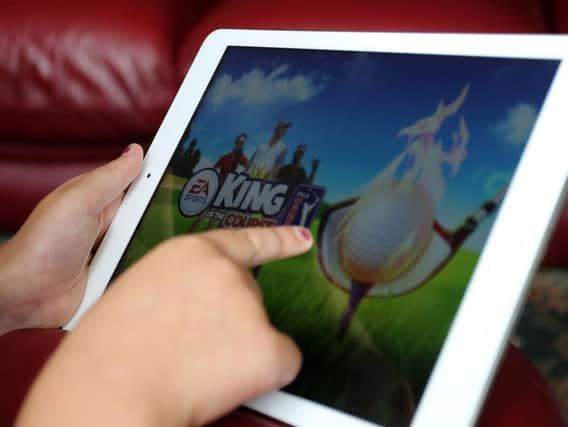Touchscreens can cause sleep problems in babies and toddlers, researchers claim


Scientists found that the more very young children used touchscreen devices, the less they slept and the longer they took to fall asleep.
Every additional hour of touchscreen use led to nearly 16 minutes less sleep on average over 24 hours.
Advertisement
Hide AdAdvertisement
Hide AdProper sleep - as opposed to daytime naps - is thought to play a key role in the development of higher-level mental processes in young children.
This in turn may contribute to later emotional and social adjustment and school achievement, evidence suggests.
Lead researcher Dr Tim Smith from Birkbeck, University of London, said: "These results indicate that the popularity and accessibility of touchscreen devices has led to high levels of usage by babies and toddlers, and this is associated with reduced sleep.
"Future research is now needed to build on this initial study to try and understand whether touchscreen use is causing sleep problems and how types of use may mitigate these risks."
Advertisement
Hide AdAdvertisement
Hide AdThree-quarters of toddlers aged between six months and three years from UK families participating in the study used a touchscreen on a daily basis.
Rates of usage increased from 51% at six to 11 months to 92% at 25 to 36 months.
A total of 715 parents were questioned about their children's touchscreen use and sleep patterns.
TV and computer games have already been linked to sleep problems in children, but this was the first study to assess the impact of touchscreen smartphones and tablets.
Advertisement
Hide AdAdvertisement
Hide AdThe findings are published in the journal Scientific Reports.
Dr Smith added that earlier research by his team had associated increased active touchscreen use with quicker attainment of fine motor "milestones" in babies.
Up to the age of one year these include picking up and dropping toys, grasping objects with a finger and thumb, and transferring objects from one hand to another.
"Before totally restricting touchscreen use, which might have potential benefits, we need to understand in depth how to use this modern technology in a way that maximizes benefits and minimizes any negative consequences for young children," said Dr Smith.
Advertisement
Hide AdAdvertisement
Hide AdSome experts were critical of the study, pointing out that most of the parents taking part were highly educated and not typical of the UK population, and questioning the reliability of their answers.
Experiment psychologist Dr Andrew Przybylski, from Oxford University, said the significance of the research should be interpreted with "extreme caution".
He added: "This is yet another closed-science study reporting a modest correlation between factors that confirm our fears as parents and confirm our pre-existing biases about new technologies."
Statistician Professor Kevin McConway, from The Open University, said: "I certainly wouldn't lose any sleep over these results, if I still had young children.
Advertisement
Hide AdAdvertisement
Hide Ad"Taking the results at face value, babies and toddlers who spent more time using a touchscreen did tend to sleep less. But there are many possible explanations of that, besides the possibility that the touchscreen use directly affects sleep."